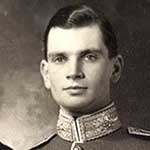|
Captain Sir Richard Carew Pole Bt OBE DL
Late Coldstream Guards
by Major General P G Williams CMG OBE
formerly Coldstream Guards

|
Richard Carew Pole died on 1st December 2024, on the eve of his 86th birthday. He was the son of Colonel Sir John Carew Pole Bt of Antony House in Cornwall, who had served in the Coldstream between the wars and whose brother-in-law was Major General Sir George Burns, a renowned Colonel of the Regiment. The Pole baronetcy dates back to the grant to an ancestor by King Charles I in 1628.
After joining the Regiment in January 1958, Richard’s military career saw him most unusually serving in all three Coldstream battalions in the space of five years, beginning in Hubbelrath in West Germany with the 3rd Battalion, which then returned to Wellington Barracks in 1959 and was placed in suspended animation. Before it did so, he had the opportunity to be the Ensign as the battalion trooped its Colour for the last time.
Transferring to the 1st Battalion, first in Chelsea Barracks and then in Victoria Barracks, Windsor, he was a platoon commander in the company commanded by Major Michael Hicks, which was seconded to the 2nd Battalion, spending six months in Gilgil, Kenya. He then returned to Victoria Barracks for his final year in the Army before retiring in February 1963. He remained a member of the Nulli, but he attended its dinners less often than he did those of the Plymouth and Cornwall branch of the Coldstream Association, of which he was a much appreciated supporter.
As his son, Tremayne, has pointed out, Richard was a complex character. He loved tradition, the history and heritage of the Coldstream, which he rightly saw as the family regiment, but he was also a secret iconoclast and saw great merit in transforming institutions from the inside. For example, he was a leading light in the move to admit ladies to the Fishmongers and in shaking up the Royal Horticultural Society (RHS). And he did all of this with a twinkle in his eye, a complete lack of sartorial elegance (something that did not remain from his military career) and he had the gift of making every person he talked to think that he or she was the most the most important person in the room.
In his fifties he found new life when the Tate St Ives project was launched and it propelled him onto the national stage where his love of meeting interesting and eclectic people was sated. He excelled in building trust and in cajoling the wealthy into supporting the Tate, the RHS and the Royal Academy.
His abiding love was Cornwall and, in particular, the Woodland Garden at Antony which he had inherited from his father and which he developed into one of the finest collections of camellias, magnolias and rhododendrons in the country.
Richard was a past Prime Warden of the Worshipful Company of Fishmongers, a past President of the RHS (which awarded him its Victoria Medal of Honour in 2007), a Trustee of the Tate Gallery, of the Pilgrim Trust and of the Eden Project and a Governor of Gresham’s School, Holt.
He was the High Sheriff of Cornwall in 1978, was appointed a Deputy Lieutenant of the county and was awarded an OBE for his untiring efforts in support of his fellow Cornishmen.
Richard is survived by his widow, Mary, his sons, Tremayne and John, and his grandchildren, Jemima, Lucian, Thomas, Nicholas and Daisy. Our thoughts and sympathies are with them all. |
|

